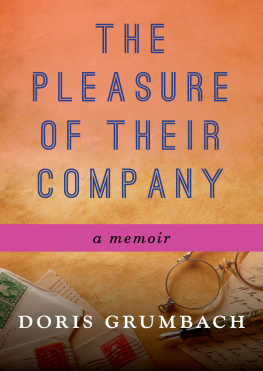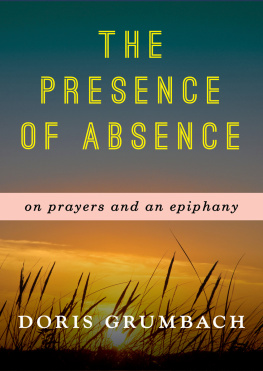The Pleasure of Their Company
A Memoir
Doris Grumbach

The Pleasure of Their Company
I planned a party in July. I would be eighty. I had never had a large party before. I would look back to find friends to invite. My address book had their names, but a few of them were no longer here.
One grows old, and the people one loved have died and, strangely, taken on vitality in contrast to the living. The sad part of having old friends is that they are gone long before you are ready to have them leave. But still, they remained, leeches on the memory, suddenly coming alive to me when I least expected them. They appear by involuntary memory, never through an act of will, certainly not of reason. Effort could not bring them back. Yesterday, because it was her birthday, I remembered that Maggie would be one hundred if she had lived.
I see Margaret Schlauch as she was sixty years ago, a whiz at languages and an always-smiling-as-she-lectures professor of the history of the English language, Geoffrey Chaucer, medieval literature, seated on a bench in the zocalo in Mexico City reading a Spanish newspaper aloud to me, me, the dullard-at-acquiring-languages student of seventeen. I was so slow at learning Spanish that she had adopted this oral method to accustom my ear to the sounds. We had been in Havana for a month, in Mexico for two weeks, and she, who knew hardly a word of the language when we sailed on the Morro Castle (later to sink tragically) from New York, now spoke fluently and had no trouble reading the paper.
Why does it come so quickly to you, and so slowly to me? I remember asking her.
Well, it grows easier the more languages one knows, I suppose.
How many do you know?
About fifteen, I think, she said, putting down the newspaper. She opened a slim pamphlet that contained lists of words in Nahuatl, the language of the Aztecs. She came to Mexico to begin constructing the first Nahuatl grammar.
Oh well, I thought as I opened my beginners Spanish grammar and began to work on verb tenses.
Maggie was my guide (I think the correct current terms are mentor or role model, but I dislike them both), as well as my friend and teacher. She made medieval literature so compelling as a scholarly endeavor that I changed my undergraduate major from philosophy to English (to Sidney Hooks disgust who assured me Professor Schlauch was not a thinker). In 1952 when she refused to take the loyalty oath required of college teachers at that time (she was a member of the then-legal Communist Party, I believe), she went to Poland to live and establish the department of English philology at the University of Warsaw.
Did she know Polish when she left? I doubt it but still, in the bibliography that appeared in a Festschrift to her published in 1971, there is listed a scholarly article on Chaucers Troilus and Cressida written in Polish less than two years after her arrival in Warsaw.
We stayed in touch by means of her serious publications and my very slight novels in the early sixties. Always, hers came inscribed and one of mine was dedicated to her. Oddly, she stepped far outside her scholarly medieval world in 1969 to review for the Southern Review two books on the poetry of meditation. At the top of the offprint of it she sent to me she wrote: A strange subject for a life-long non-believer, dont you think? They asked me for it. I must have a former student on that magazine.
One year I received a little treatise, The Doctrine of Vera Nobilitas as Developed after Chaucer, which was inscribed: With Chaucerian Greetings. She noted that initials were often like names, of persons, i.e., indicative of their occupations. She said that the Germans talk of Namenzwang (Dr. Footer the podiatrist, de Gaulle the warrior). Our initials might be called Initialszwang, hers (MS) for her lifelong work on manuscripts, mine (DIG) because you have learned to dig the younger generation.
During one of her semester visits to this country (on a diplomatic passport), she spent a day at the college in Albany at which I taught, talking about the commonality of languages (I believe I was the only person there who had ever heard of the illustrious scholar before, so the attendance was very sparse). Another time I went to visit her at the University of Connecticut, where she was teaching. We talked for hours about her life abroad (she was reticent about whether she had found there what she had gone to find, true equality and opportunity for all people) and my humdrum domestic life here. After that we lost touch.
In 1979 I asked the Polish cultural attach (who was spending a day at the Villa Serbeloni in Bellagio, where I was working) if he was acquainted with Professor Schlauch, if he knew how she was, and if he would carry an unsealed letter to her upon his return. He said he did, he thought she was well, and he promised to deliver it. I never heard from her again. She seemed to have slipped silently into that vast behind-the-iron-curtain territory from which we rarely had news. At the last I read a brief obituary in the New York Times that told me nothing except the usual facts of her birth, education, publications, and death.
It is a truism that one must have some sort of closure to be at peace with the death of a beloved. I have learned that to me the absence of closure is preferable. Without it, the dead exist somewhere, out of time and place, in permanent residence in my memory. So Maggie lives on in a remote corner of Paraguay, hard at work on the acquisition of a new language and planning a grammar of it for the Guayaki Indians.
A few weeks later, it would have been Kay Boyles ninety-fifth birthday. She has been dead for fifteen years. In my acute memory of her, she is sitting in a sunlit, meticulously furnished room in her Haight-Ashbury townhouse, dressed and coifed elegantly, her face crossed with deep lines, her prominent nose rising aristocratically beneath her high white forehead, and in her lobes the large white earrings she has worn in one form or another every day of her adult life.
She told me once about participating in a Vietnam peace demonstration in San Francisco and burning the draft cards of young men on the steps of the federal courthouse so that she would be arrested, not they. She supported the protest of black students at San Francisco State College, where she taught in her seventies. Everything about her erect, elegant person ran counter to the cliche of the young, disheveled, often violent radical. Her tired eyes lit up as she described the asservating events.
In my mind, still seated on her Victorian sofa in her tasteful living room, she is planning to go to Washington to protest the signing of the welfare bill by the president, or his betrayal of his gay and lesbian supporters in the military by making wrong-headed demands on them, or angrily on the telephone to her senator to object to the pointless, wag-the-dog bombings of sites in the Balkans, or to protest the injustices that are being perpetrated against the poor, the homeless, the sick, the wrongly imprisoned, the conscientious objectors.
Barbara Probst, who died this summer, was my friend in Mademoiselle days in the early forties, when that womens magazine was young and vigorous. She and I were in awe of the notable persons who would come by to see George Davis, the fiction editor who had published one excellent novel, The Opening of a Door. Gypsy Rose Lee, the famous stripteaser, came regularly to visit him in his minuscule office at lunchtime. Novelist Carson McCullers would take him off for drinks at the Russian Tea Room at four. Sometimes Wystan Hugh Auden and his friend Christopher Isherwood would wait in the reception room to take him to dinner.
Next page









